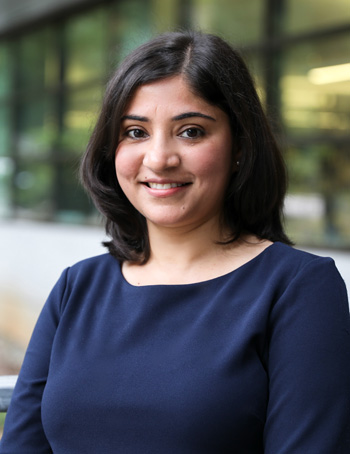Campus News
Biologist Upasna Sharma wins $1.18 million grant from Templeton Foundation
New funding will advance Sharma’s research to understand how the effects of environmental stresses can be transmitted from one generation to the next.

Upasna Sharma, assistant professor of molecular, cell, and developmental biology at UC Santa Cruz, has received a $1.18 million grant from the John Templeton Foundation to support her research on how a father’s life experiences and environment can influence the health and wellbeing of his children.
Mounting evidence supports the idea that a person’s environment, including things like diet and stressful experiences, can influence the health and longevity of their descendants. These effects are not the result of mutations or other genetic changes to the DNA passed down in the chromosomes, but are thought to be mediated by “epigenetic” factors that change how genes are expressed.
Sharma has done pioneering research on the mechanisms of this phenomenon, known as “transgenerational epigenetic inheritance,” focusing on how a father’s lifestyle or experiences can affect the development of his children. In mouse studies, she found that when males are given a low-protein diet, their offspring can have metabolic disorders that affect their development. Furthermore, her research indicates that information about the male’s diet is transmitted to his sperm via small RNA molecules.
The new grant will fund Sharma’s efforts to provide a detailed molecular explanation for these observations. This project aims to provide the first deep understanding of the key steps involved in transgenerational epigenetic inheritance of the father’s life experiences and environment.
“Determining the mechanisms of transgenerational inheritance has important implications for public health and policy,” Sharma said. “Many common metabolic diseases, such as diabetes, have both genetic components and contributions from a patient’s lifestyle and environment. Only a fraction of the heritability of such diseases can be explained by genetic variation; instead, it is now increasingly appreciated that epigenetic inheritance likely contributes to such diseases.”
Recent findings have challenged pre-existing notions about inheritance of acquired traits, which held that a hypothetical barrier—known as the “Weissman barrier”—prevents transmission of information from somatic cells (the body’s non-reproductive cells) to germ cells (eggs and sperm).
“There is a ton of data now from different laboratories that supports transmission of paternal environmental effects to offspring, but the mechanism remains a mystery,” Sharma said.
Her previous studies point to a possible mechanism, suggesting that a subset of small RNA molecules in mature sperm are not synthesized by the germ cells that produce the sperm, but instead are made in the cells of the epididymis, a long convoluted tubule where sperm mature after they are produced in the testes.
“Sperm carry very little RNA, especially compared to the egg, so one question is, are sperm RNAs transferred to the embryo at fertilization and contributing to embryonic development?”
To answer this question, she plans to generate “tracer” RNAs that she can use to track the transmission of small RNAs from the somatic cells of the epididymis to the sperm, and from the sperm to the embryo. Sharma will also investigate whether environmental perturbations cause changes in the small RNAs produced in the epididymis and transmitted to sperm. Another important question she will tackle is whether these changes are transmitted to all sperm or only a subset of them.
“We want to investigate whether all sperm are the same with respect to the epigenetic effects of environmental stressors,” Sharma said. “It’s important to know, because only one sperm fertilizes the egg, so the effects might not be seen in all of the offspring.”
Sharma received the NIH Director’s New Innovator Award from the National Institutes of Health in 2019 and a Searle Scholars grant in 2020. She joined the UCSC faculty in 2018.